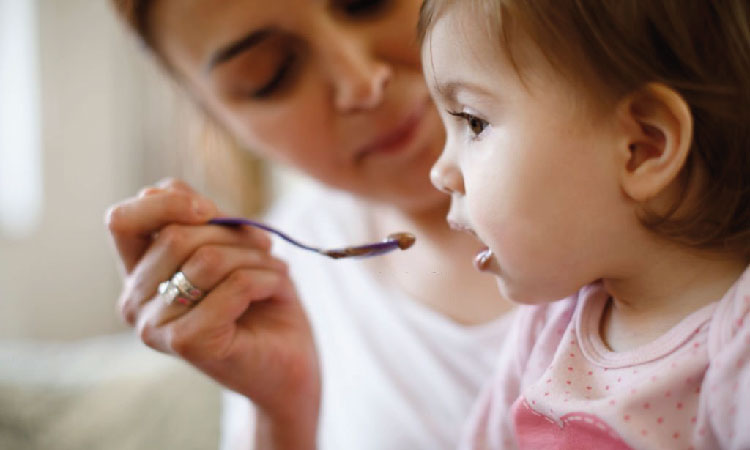At five months, you will be seeing your baby’s personality become more and more defined every day. Smiles, giggles, babbling, and fussing will probably be an everyday routine for you, along with that ever-growing curiosity. There are numerous baby milestones for you to look forward to this month.
Important Development Milestones For 5 Months Old Babies
Many of the baby milestones you get to observe this month will be with regard to your little one gaining more control over his or her body. The baby is also growing into a more social, personable little fellow. A baby’s weight typically doubles between birth and 5 months. They will gain approximately 550 grams per month and grow approximately 2 centimeters in length at this point1.
Here are the important milestones you can look out for and encourage:
- At around this time, your baby will begin to develop object permanence – that is, they will start to realize that when something leaves their presence, it is not gone forever, and continues to exist. The baby begins to grasp the concept of cause and effect2
- At birth, the baby’s eyesight would be very limited, but by the fifth month, they will be able to see much farther. They will even begin to be able to focus on objects without going cross-eyed and differentiate between colors. The baby should also be able to track the movement of objects with their eyes
- Although your baby may not be able to sit up entirely on their own, it will be able to do so when supported. You can provide this support by propping them up on pillows or letting them lean on you. This activity also helps them develop the core strength they need to eventually sit without help
- Even though they may not have perfected the skill, many 5-month-old babies are able to roll over during this time. They may have learned how to roll front to back as well as back to front. The latter may take more time, as it is more difficult to do – it requires stronger neck and arm muscles
- The baby will also be able to hold their head up on their own. They will be able to support themselves on their elbows when lying on their tummy, and even bear some weight on their legs (when you stand them up)
- Another major milestone that is achieved around this time lies in their feeding activities. The 5-month mark is a good time to start introducing the baby to solid foods, as their taste buds develop during this time. They become more sensitive to different types of tastes, and may even have a preference for certain tastes
While these baby milestones are usually reached at the age of 5 months, some babies may develop earlier, and some may develop a little later. Each child develops at their own pace, and the most important thing you can do is encourage them and engage them proactively in order to enhance their abilities.
Related Reading: Everything About Annaprashan – First Rice Eating Ceremony
Development Milestones For 5 Months Old Baby
Here are some other baby milestones your child may be reached at this age3
- Your baby becomes a babbler! During this month, your baby will begin to string together sounds (both vowels and consonants), which will eventually lead to them learning to speak
- On a related note, the baby will also be better at recognizing sounds. During the first few months, the extent to which your little one understands you relies largely on your tone of voice rather than the words themselves. But by the 5-month mark, they will begin to distinguish between words and understand some. They may even start responding to their name!
- Your baby will also start to be more active during playtime. Playtime is the time when their brain is most engaged, constantly learning and developing their knowledge about the world around them. Games like ‘peekaboo!’ will invite more giggles and the baby will be more curious about their toys. This can be used to aid their development by, for example, holding out the toy to get them to grab it
- They may begin to grow their first tooth around this time – which means they will be using their newfound ability to reach for objects to bring them into their mouth to bite down on them. It is a good idea to keep small, hazardous things out of reach.
- Your baby will probably have settled into a (mostly) consistent bedtime routine and schedule, as well as a feeding schedule. They may nap 2-3 times a day, and get about 6-8 hours of sleep at night4
- Your baby’s recognition ability will also develop at this point. They should be able to identify familiar faces and objects. Their main caregivers, siblings, favorite toys, etc. will be recognized by them, and they may show their preference by reaching for the person/object in question
Related Reading: How To Make A Baby Laugh? 12 Ways To Make Her Giggle!
Feeding Milestones

As your baby grows and develops, so do their eating habits. You must adapt in turn and encourage the development of their palate and appetite, as well as provide them with the necessary nutrients.
These baby milestones related to feeding will help you ensure you are on the right track5:
- At this age, the baby still relies mostly on breast milk or formula. A breastfed baby needs to be fed 5 to 7 ounces every 3 to 4 hours. Whereas, formula-fed babies require around 5 to 6 ounces every 4 to 5 hours. However, this measure is not absolute, and it is normal for your baby to want to feed a little less or a little more on some days
- However, you can begin to introduce your baby to solid foods, a little at a time. The most recommended time for solids is 6 months, but it is also safe to do it when the baby is 5 months old, if suggested by the doctor. There are a few signs that your baby is ready to start having solids:
- The baby is able to hold their head up on their ownThe baby opens their mouth when you bring the food near themThe baby weighs double their birth weight, or at least weighs 13 poundsThe baby’s tongue-thrust reflex has reduced – that is, they are able to swallow the food after moving it to the back of their mouth, rather than automatically pushing it out with their tongue
- The baby reaches for solid foods when in their vicinity6
Don’t be discouraged if the baby does not take to solid foods immediately, or is sporadic in their acceptance of them. Simply wait a couple of days and try again. It is recommended that you introduce the baby to one new food item at a time – this will help you identify whether your little one is allergic to any particular food.
Related Reading: When And How To Introduce Sooji To A Baby?
Sleep Milestones
Any parent of a baby knows that sleep schedules can be one of the most tiresome things to figure out. But as your baby grows older, things start to get easier. At the age of 5 months, your baby is slowly moving out of the “newborn” phase, and that comes with a few important baby sleep milestones.
- This is the age at which the baby starts to finally sleep through the night. They should be able to get in a good 8 hours or so every night, though this number is not universal. The baby needs around 10 hours of sleep each night, give or take a couple of hours
- Additionally, they will also start to learn to fall back asleep on their own. Unless they are hungry or require a diaper change, they should be able to fall back asleep even if they occasionally wake up during the night
- The baby will also take around 2-3 naps during the day. The total amount of time the baby spends asleep will be about 12-15 hours. The actual number can vary from baby to baby7
- It is a good time to begin sleep training for the baby if that is something you wish to do
- Remember: your baby knows how to roll over now. Increasingly, you may find them rolling over in their sleep. It is important to take the necessary measures to ensure they do not fall while they are asleep
Related Reading: Night Sweats In Babies- All You Need To Know
Speech Milestones
Milestones to watch out in the speech department will be aplenty this month! While your baby may not be speaking in proper words, they have begun experimenting with their mouth sounds. Safe to say, expect a lot of babbling, giggling, and communication from them.
- The baby will start being more adept at sounding out consonants, and more complicated combinations of consonants and vowels. Sounds like “bah”, “dah”, “gah”, and “a-gah” will constitute your little one’s vocabulary. They will also begin repeating the sounds, like “ma-ma-ma-ma”.
- They may also start to use particular sounds for particular things. For example, they may have a particular cry when they are hungry, another to signal they are sleepy, etc8
- The baby will be able to recognize their own name. This means that, before they would discern your meaning through your tone and expression, they are now able to understand (some) words. If you say their name, they may respond with a babble or a gurgle, or turn to look at you
- The baby may even attempt to have “conversations” with you. They will raise and lower their volume as if speaking to you, and respond to your words with their own babbles
Related Reading: 9 Early Signs Of Intelligence In Babies
Physical Milestones

Last, but not least, with every month, your baby grows and develops physically – both in size and in abilities. These baby milestones may be the most recognizable or obvious, but they also require your support and encouragement9
- Size-wise, the baby should have grown about ½ to 1 inch this month. They will have grown to double what their weight was at birth
- This is the month your baby will be able to roll over both ways – from tummy to back, and from back to tummy
- When lying on their tummy, the baby will also be able to push themselves up on their elbows (by doing the baby version of a pushup). This is accompanied by the ability to raise their heads without outside support
- The baby will also be able to reach for objects. They may even be able to hold up their own milk bottle and feed themselves
- When you stand your little one up, holding them vertically, they will be able to bear some weight on their legs, though they won’t be able to support themselves entirely. They may even try to bounce on their legs
Related Reading: Top Benefits Of Baby-wearing: Is It Right For You?
How To Keep A 5-Months-Old Baby Busy
If you are wondering, “what to do with a 5-month-old baby all day” you are not the only one. It can be difficult to come up with activities that both engage them and aid in their development. So here are a few 5-month baby activities:
- Sing to your 5-month-old: According to research, parents are often the primary source of auditory stimulation for their infants and may be perceived as their preferred vocalists. Not only do they exhibit a fondness for auditory stimulation, but they also demonstrate an ability to acquire vocabulary through speech perception. The frequency with which she is exposed to those words positively correlates with her ability to recall them. It is recommended to maintain dynamics and incorporate facial expressions when performing vocal music. This can be one of the things to do with a 5-month-old outside as well
- Talk to the baby: No matter how big or small they are, no child likes being treated like they are incapable of something. So have actual conversations with your child. Not only will it make them feel involved and engaged, but it will also encourage their social skills and vocabulary. It helps them develop their speech
- Read stories with them: Buy a few brightly illustrated books, with many colors and possibly even textures, and read them aloud with your little one. At the age when they are starting to be able to tell one color from the other, they will certainly enjoy the experience, and a reading habit is a good one to encourage for their later life. It is one of the best things to do with a 5-month-old inside
- Tummy time: This is a very useful form of play for any baby. Place them on their tummy during playtime and allow them to move their limbs around, reach for objects and play with toys. This will occupy them for quite some time. It is also useful for developing their muscles, dexterity, and even vision
Related Reading: Using Silverware For Babies -Importance, Benefits, And Precautions
When To See A Doctor
Every baby develops in their own time, and a little discrepancy here and there is nothing to be worried about. However, if the baby is unable to achieve a few particular baby milestones, or is showing some other difficulty, it could be a developmental delay or even some serious issue. Here are a few signs you should consult a doctor:
- The baby does not make sounds or babble
- The baby does not respond to sounds in any way
- The baby does not show affection or familiarity to close family members like caregivers, siblings, etc.
- The baby does not weigh double their birth weight
- The baby does not reach for things or only reaches with one hand. Also, if they display difficulty in grabbing objects and holding them10
- The baby spits up constantly, which is a habit they should have outgrown by this point
Conclusion

The fifth month is definitely an exciting one, especially for new mothers. It is a time when your bundle of joy achieves several important baby milestones, particularly in how they interact with other people and objects.
The exact timing and extent of these milestones may vary from baby to baby, and there is no rush in regard to the particulars, but by and large, these milestones need to be achieved. If there is some major difference in how your baby develops and how they are supposed to develop, it would be best to consult their healthcare provider.

